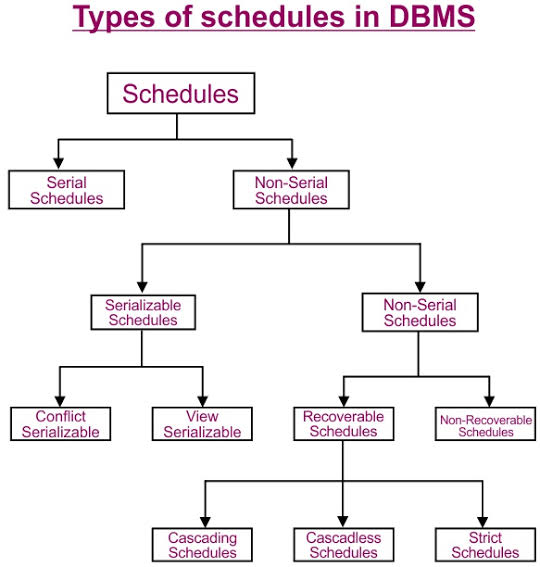In the previous section we’ve study about serializability and its types. In this section we’ll study about NON SERIALIZABLE SCHEDULE AND ITS TYPES. NON SERIALIZABLE SCHEDULE AND ITS TYPES. It has two types recoverable. And non recoverable schedule.
TYPES OF NON RECOVERABLE SCHEDULES:
- RECOVERABLE SCHEDULE
- NON RECOVERABLE OR IRRECOVERABLE SCHEDULE
RECOVERABLE SCHEDULE:
Schedules in which transactions commit only end. That means it commit only after. All transactions whose changes they read commit are recoverable. Or . We can say if in a schedule a transaction performs dirty read operation. From an uncommit transaction. And its commit operation is delay. Till the uncommitted transaction. Either commits or roll back. Then such schedule is call as recoverable schedule. Reading from uncommitted transaction is call as dirty read.
IRRECOVERABLE SCHEDULE:
If in a schedule . A transaction performs dirty read. From uncommitted transaction. And commits before the transaction from which it has read values. Then such schedule is call as irrecoverable schedule.
Furthermore, we’ll study about types of recoverable schedule. Its types are:
- Cascading schedule
- cascade less schedule.
- strict schedule.
Cascading schedule and cascade less schedule
If in a schedule. Failure of one transaction affects another transaction. That means it causes several other transactions to rollback or abort. Then such schedule is call as cascading schedule. Or cascading rollback. Or cascading abort. It simply deals to the wastage of CPU time.
If in a schedule a transaction is not allowed to read a data item. Until the last transaction that has written it is committed or abort. Then such schedule is called as cascade less schedule. Cascade less schedule allows only committed read operations. Therefore it avoids cascading roll back . Thus it saves CPU time.
NOTE: Cascade less schedule allows only committed read operations. However it allows only committed write operations.
STRICT SCHEDULE :
IF in a schedule a transaction was neither allowed to read. Nor write a data item until the last transaction commits or abort. Then such schedule is call as strict schedule. In other words we can say. Strict schedule allows only committed read and write operations. Clearly strict schedule implements more restrictions. Than cascade less schedule.
POINTS TO REMEMBER:
- Strict schedules are more strict . Than cascade less schedule.
- All strict schedules are cascade less schedule.
- All cascade less schedules are not strict schedules.





